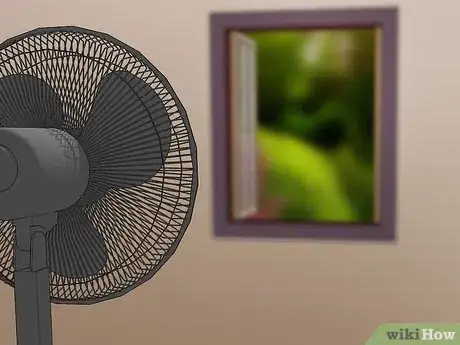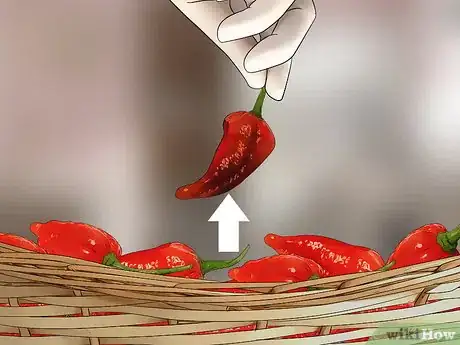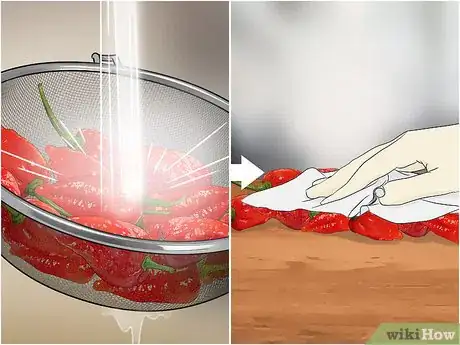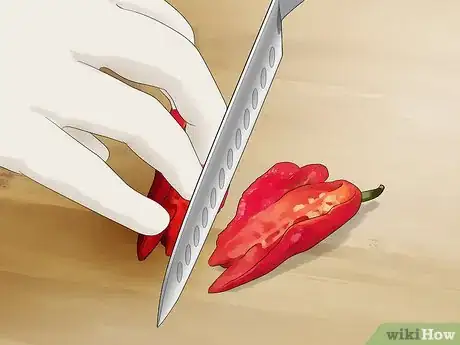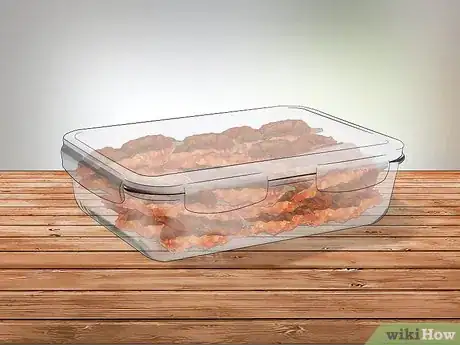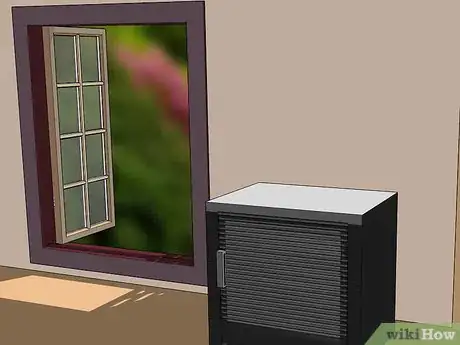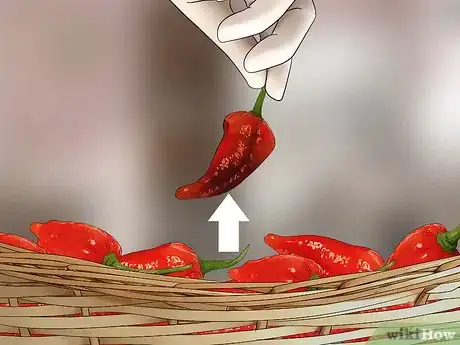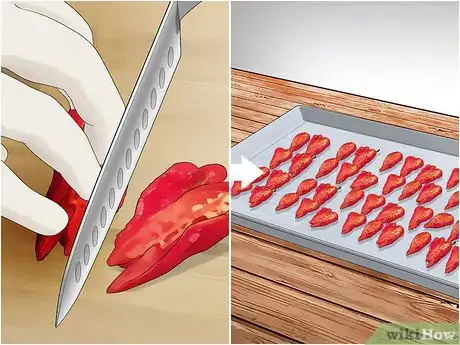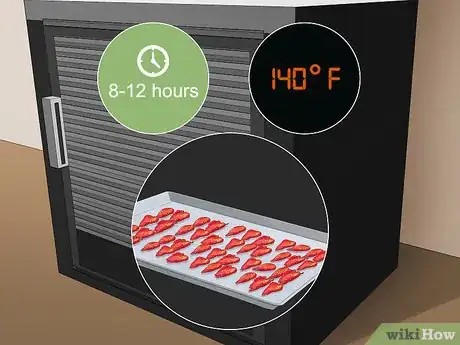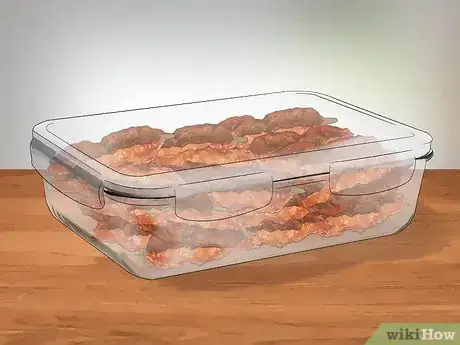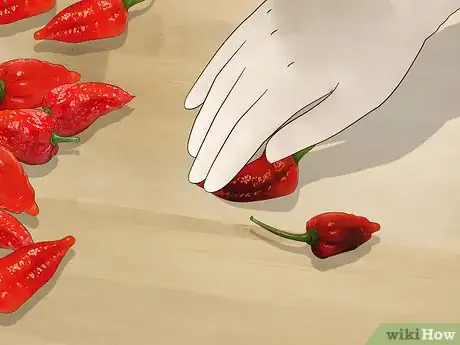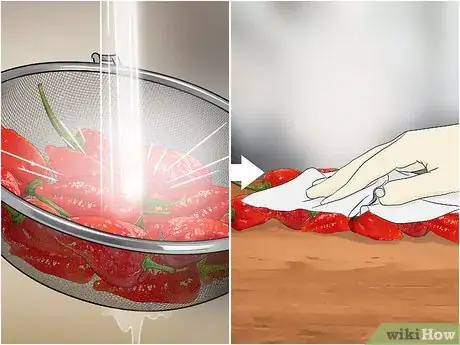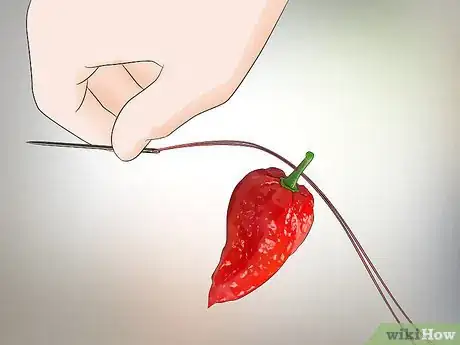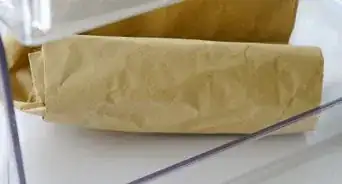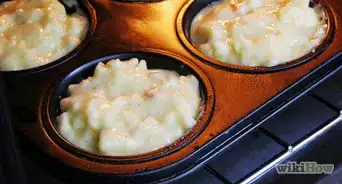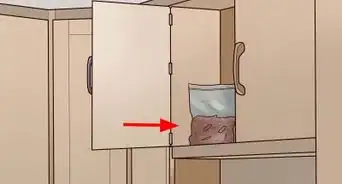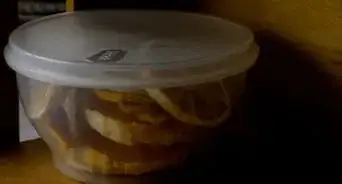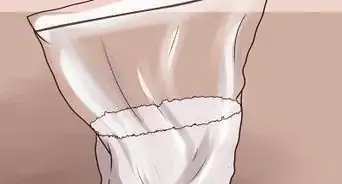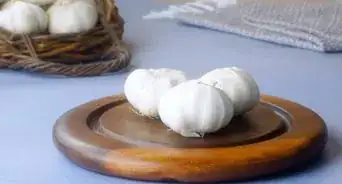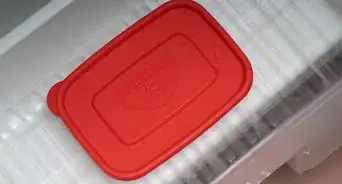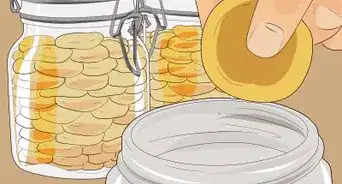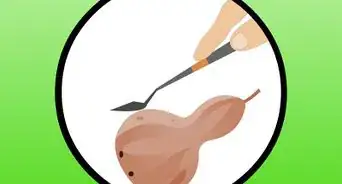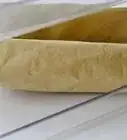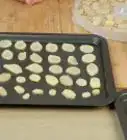This article was co-authored by wikiHow Staff. Our trained team of editors and researchers validate articles for accuracy and comprehensiveness. wikiHow's Content Management Team carefully monitors the work from our editorial staff to ensure that each article is backed by trusted research and meets our high quality standards.
This article has been viewed 29,422 times.
Learn more...
Drying ghost peppers may seem like a daunting task. The ghost pepper, after all, once held the title of the hottest pepper in the world.[1] Don’t let the ghost pepper’s heat stop you from working with this pepper, whose fantastic flavor and a fruity taste rewards every brave soul who tackles the spicy chile. Drying ghost peppers is an excellent way to enhance their flavor and spice and use the pepper in a different way. The dried pepper is slightly hotter and more flavorful than when eaten fresh. While anyone cooking with the hot ghost pepper should take extra care, drying them yourself will yield a long-lasting pantry staple. Just don't forget to use gloves.
Steps
Drying Ghost Peppers in the Oven
-
1Use fans and open windows to get air flowing in your kitchen. Because warmed chile peppers release irritating fumes, it is important that you are working in an area that has lots of airflow. You want your result to be tasty dried chile peppers, not a home filled with painful chile fumes. [2]
- Use ceiling fans, portable fans, and open windows.
- Be cautious when working around children and pets.
- Always use gloves when handling ghost peppers, and be very careful touching other parts of your body (especially sensitive areas like your eyes and face).
-
2Get rid of any spoiled peppers. When you are preparing to dry the ghost peppers, it is important that you start with a group of pure, firm peppers. Look out for rotten peppers or peppers that have mushy or discolored spots. Use your nose to sort out any peppers that smell rotten.
- It is important to cull out any spoiled peppers because they will only continue to spoil as they dry.
Advertisement -
3Wash and dry the fresh ghost peppers. Using warm water, wash your peppers to get rid of any dirt, germs, or pesticides. Make sure to dry them completely with a cloth or paper towel.
-
4Cut the peppers in half and lay them on a cookie sheet. Peppers cut into smaller pieces will dry out faster and more evenly.[3] Arrange the peppers so that there is plenty of space in between each one. You want every part of the pepper to be exposed to the heat, giving the whole chile a chance to sweat out moisture.
- You can remove the seeds if you like, but it is not completely necessary. Many seeds will fall out during the drying process.
-
5Cook the peppers in an oven set to 120–140 °F (49–60 °C). Drying peppers in the oven can take anywhere from a few hours to a few days. You’ll want to flip them roughly every hour so that both sides have a chance to dry in the heat. Keep your oven door open slightly so that the moisture they release can escape.[4]
- Remember that you are trying to dry the peppers, not cook them. If they develop brown or black spots, you can try to turn the temperature down slightly or flip them every thirty minutes rather than every hour.
-
6Store the dried ghost peppers in an airtight container. Once the peppers have fully dried out, you can store them in Tupperware, a sealed glass jar, or a Ziploc bag.
- Dried peppers can last for over a year in an airtight container, stored in a cool, dry place.[5]
Using a Food Dehydrator to Dry Ghost Peppers
-
1Set up a food dehydrator in a well-ventilated space. Whenever you are heating ghost peppers (even in a dehydrator), it is important that there is plenty of air flowing in your home. The warmed ghost peppers will release some of their spice into the air and can be irritating to your eyes and throat.
- Use ceiling fans, portable fans, and open windows.
- Be cautious when working around children and pets.
- Always use gloves when handling ghost peppers and be very careful when touching other parts of your body, especially your eyes and face.
-
2Discard any spoiled ghost peppers. It is important to start with healthy, fresh ghost peppers, as peppers that have started to spoil will only continue to rot as they dehydrate. Discard any peppers that have mushy or discolored areas or that smell rotten.
-
3Wash and dry the ghost peppers thoroughly. Washing the peppers in warm water helps get rid of any dirt, foreign matter, or pesticides. Spend extra time making sure your peppers are thoroughly dry.
-
4Cut the peppers in half and place them onto the dehydrator tray. When you assemble the peppers onto the dehydrator tray make sure to leave space between each pepper so that they dry evenly and quickly.
- Cutting larger peppers in half will help them dry faster and evenly.
- Any peppers under an inch in size can remain whole.
-
5Dehydrate the ghost peppers for 8 to 12 hours at 135–145 °F (57–63 °C). You can check on them every few hours to see if smaller peppers have finished sooner than the rest.
- Remove small peppers as they finish drying.
- Especially large pieces may take longer than 12 hours. [6] Be patient and give them the time that they need. You will be rewarded in the end.
-
6Store dried peppers in an airtight container. Once the peppers have fully dried, you can store them in Tupperware, a sealed glass jar, or a Ziploc bag.
- Dried peppers can last for over a year in an airtight container, stored in a cool, dry place.
Air-Drying Ghost Peppers
-
1Discard any fresh ghost peppers that are spoiled. Starting with fresh, unspoiled peppers will result in higher quality dried peppers. Keep your eyes peeled for peppers that have discoloration or overly soft, wet, spots. Take care to sort out any peppers that smell rotten.
- Choose peppers that have a significant stem or cap that can easily be sewn through.
-
2Wash and dry the ghost peppers. Spend extra time making sure your peppers are fully dry. The point of dehydrating the chiles is to remove all of the moisture from the pepper, so be sure you give those peppers the best chance to dry out by beginning with dry peppers.
-
3String the ghost peppers with a needle and thread. Create a ghost pepper garland by threading your needle with enough thread to hang your ghost peppers. Sew the needle through the stem or cap of the pepper and leave an inch of space between each pepper.[7]
- You can tie knots on either side of each ghost pepper, so they don't touch or slide together.
- You can also tie sticks onto both ends of the garland. Attaching sticks to the ends of the garland will make your garland look more interesting (you will, after all, be looking at it for a few weeks), and it will also help you to hang it.
-
4Hang the ghost pepper garland indoors in a warm, dry place for three to four weeks. Check on the pepper garland every few days and remove any peppers that have spoiled. Enjoy your beautiful ghost pepper garland as time and air do all the work for you.
- Depending on your climate, it could take longer than four weeks for the peppers to dry in this way. Humid air creates problems for air-dried ghost peppers. If you happen to be in a humid season, you may want to hang your garland in a room that has a dehumidifier running.
-
5Store the dried peppers in an airtight container. Tupperware, a sealed glass jar, or a Ziploc bag are all good options.
- Dried peppers can last over a year in an airtight container, stored in a cool, dry place.
Warnings
- Ghost peppers are extremely hot and touching them can irritate your skin.⧼thumbs_response⧽
- Always use gloves when handling ghost peppers.⧼thumbs_response⧽
- Avoid touching any sensitive part of your body (especially your face) after handling.⧼thumbs_response⧽
- Be sure to work in a well-ventilated space.⧼thumbs_response⧽
- Take extra care around children, pets, and anyone especially sensitive to spice.⧼thumbs_response⧽
References
- ↑ https://www.foodandwine.com/fwx/ghost-pepper
- ↑ http://www.berkeleywellness.com/healthy-eating/food/article/how-handle-chili-peppers
- ↑ http://www.scottrobertsweb.com/ultimate-guide-to-drying-hot-peppers/
- ↑ http://www.scottrobertsweb.com/ultimate-guide-to-drying-hot-peppers/
- ↑ https://www.epicurious.com/ingredients/types-of-dried-chiles-how-to-buy-and-store-article
- ↑ http://www.scottrobertsweb.com/ultimate-guide-to-drying-hot-peppers/
- ↑ https://cedarcirclefarm.org/tips/entry/drying-peppers
